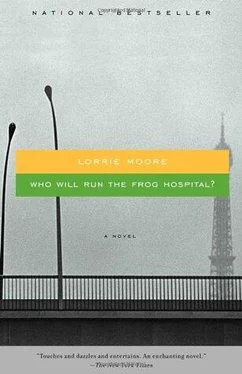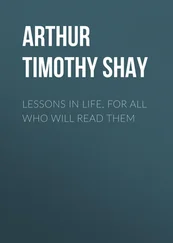He shifted, twisted around slightly, and smiled in a lopsided, ungainly way. “How’s it go?”
I hoped he wasn’t going to be perverted. You never knew. “I’ll show you,” I said in a teacherly way, and I climbed out with my cards and got into the front seat with him, dealt out the hands, and explained.
After ten minutes, he was shifting excitedly in his seat. “I think I’m getting the hang of this,” he announced. His short legs thrashed with joy.
“It’s a great game,” I said, though I was losing, too timid in the bidding.
After about forty-five minutes there was a knock at the window. It was Sils looking hot and annoyed, and I leaped out to greet her. I put my hand on her thin tan upper arm.
“Are you OK?”
“Where were you?” she asked.
“I came out here where it was cooler.”
Humphrey reached around to unlock the back door and we both piled in, Sils a little gingerly, I with a kind of rushed efficiency, still clutching my bridge hand. Humphrey handed me the rest of the pack. “All set? Time to go back?”
“Yeah,” I said.
“Can we stop for a Coke somewhere on the way?” Sils asked a little absently.
“Sure,” I said.
“No problem,” added Humphrey and I simultaneously, like a frog chorus after all.
Through the whole drive back I kept trying to steal glances at Sils to see if she looked any different. She had now gone through so many things that I hadn’t, I wondered more than ever whether she could still like me, be the same as she had been, or even remember things we’d done together. Was there a ghost, an amphibious baby ghost, flying out behind us, above us, all the way home like a kite? Under Sils’s arms there were dark circles of perspiration on my green shirt. Her hair had grown oily and the front had separated into strands. I leaned over to loosen the buckle of my sandals, and when I turned to look up at her, from that angle, I could see a small, golden bugger floating in the dark of her right nostril like a star — odd and alone, speaking dizzily without words.
We found a drive-in — Custard’s Last Stand — five miles past the Vermont state line, and there we all got out for Cokes, all three of us sitting awkwardly on one of the picnic tables outside. We gave Humphrey the money, and he got out of the car, limping from the hip, and fetched the drinks. We had commandeered this round, broken egg of a man — the human omelette! — but he seemed to like it. Back beside us, he sipped his own Coke slowly, expectantly. He looked happily around at us to see what we’d say next, as if we were the source of unending amusement and surprise. The Green Mountains were to the back of us, the Adirondacks to the front, and although the sun set sooner in the mountains, it was still only five o’clock, the very summit of a long summer afternoon, and it wouldn’t be dark until nine. Four more hours of sun and heat and this day — which I was starting to experience with the vertigo of the sick, the way the sick fall beneath the slats of each minute, looking up at things from the spaces in between, the world faraway and in stripes of light — would be over. I felt not myself. I felt beneath somewhere, in a pool of breath and gas.
I had to work at Storyland that night, the seven-to-ten shift, strange for me, but I was taking over for another cashier who needed the night off for a party, she said, though she’d told Isabelle her aunt had died and she had to go to the wake.
“You girls take care” was all Humphrey said, before he dropped us both off at Storyland, where Mike was waiting to pick up Sils.
“Where’ve you been?” Mike yelled over his revving Harley, and I saw her weakly, automatically, get on his motorcycle and forget to wave to me until they were halfway down the road and then she looked back and waved.
Inside, Storyland was mobbed with people, but the dressing room was empty, and I changed into my ludicrous uniform in an open, careless way, no longer hiding myself, no longer letting my shirt form a large wreath around my neck to hide my chest but just letting my whole body briefly live in the air of the room as I never really had, in my shame at looking so little. Seeing my reflection in one of the mirrors on the side of a row of lockers I could see how lanky and thin I was, skeletal; there were dark circles under my eyes, bug bites on my sticklike arms, bruises on my shins. But my hair was in a cloud, bushy in the heat, wild and wavy, and it alone caused me to feel that I was starting to bloom, that I was a blossom bursting out the top of myself, through the skull, like an anemone the very heat of whose thoughts caused appendages to sprout searchingly in water: I was no longer just a girl with nothing to think or do. For a moment, before I walked out with my straw hat and uniform and money box to stand mechanically in the muggy night, I was something else.
THERE IS a joke about a middle-aged woman who happens upon a frog in the woods. “Kiss me! Kiss me!” says the frog, “and I’ll turn into a handsome prince!”
The woman stares, entranced, but doesn’t move.
“What’s the matter?” asks the frog, growing impatient. “Don’t you want a handsome prince?”
“I’m sorry,” says the woman, “but at this point in my life I’m actually more interested in a talking frog.”
“I get it,” says Daniel. “That’s funny. That’s good.” I take his hand, lay it across my mouth, press it there. In travel one’s husband’s body becomes yours; you become united, merged, and you have the same arguments with it that you would with your own. Travel, at those times, becomes love, possession, the second wedding — not just an excuse an unhappy person can use to wear the same clothes every day. Which is what it could be, otherwise.
The gurgling coo of pigeons awakens us each morning. “Wake up and eat the daisies,” Daniel whispers to me. We watch the pigeons leap winglessly from the ledges, as if in sailor dives, only spreading their wings at the last minute.
“Is that for aerodynamics?” I ask. “Is that to work up momentum?”
“It’s laziness,” says Daniel. “They’re just being lazy.”
Here in the Marais we wake early in the mornings and are in bed early at night. We miss National Public Radio. We miss recycling, as silly or meager as that sounds. Everything we use here must be thrown away, and it bothers us, robbed of our rituals of composting and reclamation, our daily treks out back to the rot-heap, where we offer the Earth scraps of itself, returning nature to nature! Expediting the Global Easter, when all shall rise again! Though we mean it, and mean to, we’ve never actually used the compost: it is merely an act of apology.
While here for three weeks we live in unapologetic sin. Touristic waste, native presumption. The Parisian meanness makes us despair, so grounded in opinion as it is — unlike the meanness of Americans, which is all careless ego, selfishness, the stuff of spoiled, stupid children.
At night, Daniel is tired from the medical conference he is here at the Institut de Génétique to attend. As a researcher he is mostly, recently, interested in the Tay-Sachs gene we both carry — what Jews and French Canadians have in common (“We’ll simply tell our daughter we got her retail rather than wholesale,” says Daniel, after we investigated the difficult procedures of adoption, the empty room upstairs we call the “Maybe’s Room” still empty, our desires becoming courteous, less determined, discerning the hoops and circumstances). Now this conference seems to him bogged down with squabbles about who should be in charge of the institute itself, research ownership, other such infighting. “All the lying and coffee it takes to get anything done at all,” he says, have exhausted him. “Quick, a bonbon!” he exclaims.
Читать дальше












